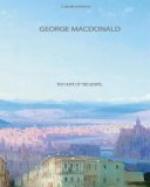Could we see things always as we have sometimes seen them—and as one day we must always see them, only far better—should we ever know dullness? Greatly as we might enjoy all forms of art, much as we might learn through the eyes and thoughts of other men, should we fly to these for deliverance from ennui, from any haunting discomfort? Should we not just open our own child-eyes, look upon the things themselves, and be consoled?
Jesus, then, would have his parents understand that he was in his father’s world among his father’s things, where was nothing to hurt him; he knew them all, was in the secret of them all, could use and order them as did his father. To this same I think all we humans are destined to rise. Though so many of us now are ignorant what kind of home we need, what a home we are capable of having, we too shall inherit the earth with the Son eternal, doing with it as we would—willing with the will of the Father. To such a home as we now inhabit, only perfected, and perfectly beheld, we are travelling—never to reach it save by the obedience that makes us the children, therefore the heirs of God. And, thank God! there the father does not die that the children may inherit; for, bliss of heaven! we inherit with the Father.
All the dangers of Jesus came from the priests, and the learned in the traditional law, whom his parents had not yet begun to fear on his behalf. They feared the dangers of the rugged way, the thieves and robbers of the hill-road. For the scribes and the pharisees, the priests and the rulers—they would be the first to acknowledge their Messiah, their king! Little they imagined, when they found him where he ought to have been safest had it been indeed his father’s house, that there he sat amid lions—the




